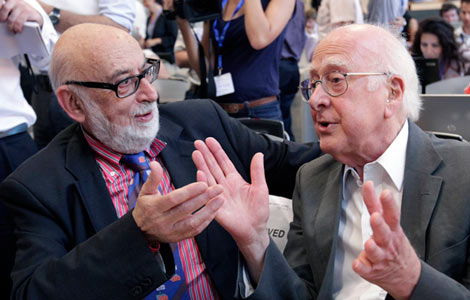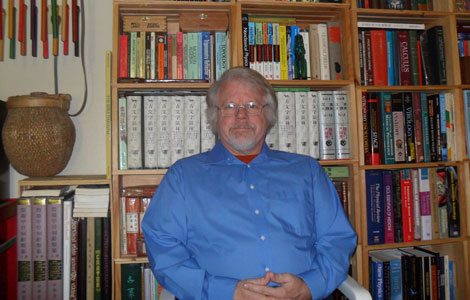Higgs and Englert win physics Nobel prize
Updated: 2013-10-09 03:15
(Agencies)
|
||||||||
REMAINING QUESTIONS
Although finding the Higgs boson is a remarkable achievement - and one which Higgs once said he never expected to see in his lifetime - it is not the end of the story for physicists trying to understand the structure of the universe.
Scientists are now grappling with other mysteries such as understanding the nature of dark matter, which accounts for more than a quarter of the universe, and dark energy, which is believed to be the driver of cosmic expansion.
Asked how it felt to be a Nobel winner, Englert told reporters by phone link to Stockholm: "You may imagine that this is not very unpleasant, of course. I am very, very happy to have the recognition of this extraordinary award."
CERN Director General Rolf Heuer said he was "thrilled" that the Nobel prize had gone to particle physics. He said the discovery of the Higgs boson at CERN last year marked "the culmination of decades of intellectual effort by many people around the world".
Some physicists were surprised that there was no recognition for the CERN teams that discovered the new particle, since there had been speculation of a prize for CERN as an institution.
The will of Swedish dynamite millionaire Alfred Nobel limits the award to a maximum of three people - harking back to an earlier era when science was conducted by individuals or very small teams.
However, thousands worked on detecting the particle at CERN and a total of six scientists published relevant papers in 1964.
Englert, 80, and his colleague Robert Brout - who died in 2011 - were first to publish; but the now 84-year-old Higgs followed just a couple of weeks later and was the first to explicitly predict the existence of a new particle.
Similar proposals from American researchers Carl Hagen and Gerald Guralnik and Britain's Tom Kibble appeared shortly afterwards.
Kibble said it was no surprise that he and his colleagues were not included in the Nobel honour since "our paper was unquestionably the last of the three to be published in Physical Review Letters in 1964 - though we naturally regard our treatment as the most thorough and complete".

 Last photos of Hungarian wingsuit diver
Last photos of Hungarian wingsuit diver
 In photos: Typhoon Fitow aftermath
In photos: Typhoon Fitow aftermath
 Japan-US military drill raises tension
Japan-US military drill raises tension
 Higgs and Englert win physics Nobel prize
Higgs and Englert win physics Nobel prize In Bali, they relax in local fashions
In Bali, they relax in local fashions
 Post office for Liaoning carrier opens
Post office for Liaoning carrier opens
 A smog-filled Beijing targets polluting cars
A smog-filled Beijing targets polluting cars
 Animal welfare to be added in training
Animal welfare to be added in training
Most Viewed
Editor's Picks

|

|

|

|

|

|
Today's Top News
Trending News across China on Oct 9
Xiaomi's Barra ready to take on Beijing
A day of cultural exchange at Pace University
ZTE, Houston Rockets shooting for global markets
Global firms facing HR challenges in Asia
Back to 1942, entered for the 86th Oscars
Obama says he'll negotiate once 'threats' end
Unprotected sex brings sharp rise in HIV/AIDS
US Weekly

|

|






